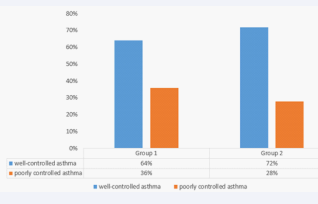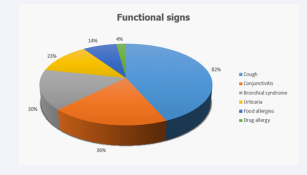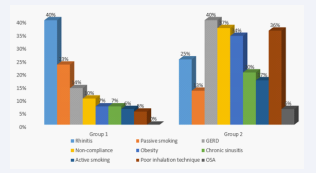Asthma Control and its Predictive Factors
- 1. Department of Pulmonology, 20 august 1953 “ Hospital “, Morocco
Abstract
Asthma is a multifactorial chronic respiratory disease resulting from both genetic and environmental factors. Asthma control is the ultimate goal of asthma management. Asthma control is assessed primarily by clinical evaluation. There are several easy and accessible methods for assessing asthma control, such as the ACT and the ACQ. We present a retrospective and comparative study, including 80 patients seen in allergology consultations at the respiratory diseases department of the Hôpital 20 aout in Casablanca over a period extending from January 2020 to October 2022. The results are compared with those of a previous study carried out in the same department in 2019, which enrolled 173 patients. Patients are divided into two groups. The aim of this study is to determine the factors associated with asthma non-control and to analyze the evolution of predictive factors of asthma non-control in asthmatic patients seen at the respiratory diseases department of the August 20 Hospital in Casablanca.
KEYWORDS
- Asthma
- Chronic respiratory disease
- Asthma control
CITATION
Nahidi M, Arfaoui H, Zadi M, Bamha H, Msika S, et al. (2025) Asthma Control and its Predictive Factors. JSM Allergy Asthma 6(1): 1029.
INTRODUCTION
Asthma is a complex, multifactorial chronic respiratory disease that affects over 300 million people worldwide, making it one of the most prevalent chronic diseases globally. In Morocco, the prevalence of asthma is significant, ranging from 6.4% to 16.2% of the population, highlighting the need for effective management and control strategies.
Asthma control is a critical concept in the management of the disease, defined as the assessment of daytime symptoms, night-time symptoms, activity limitation, and the use of rescue medication over the last four weeks. Achieving and maintaining asthma control is the primary objective in the management of asthma patients, as it enables individuals to lead active, symptom-free lives, while minimizing the risk of exacerbations and related complications.
Despite the availability of effective treatments, many asthma patients remain poorly controlled, experiencing persistent symptoms, reduced quality of life, and increased healthcare utilization. In Morocco, the burden of uncontrolled asthma is likely to be significant, given the high prevalence of the disease. Therefore, improving asthma control is a pressing need, requiring a comprehensive approach that incorporates evidence-based guidelines, patient education, and multidisciplinary care.
PATIENTS AND METHODS
This is a retrospective and comparative study, including 80 patients seen in allergology consultations at the respiratory diseases department of the 20 aout Hospital in Casablanca over a period running from January 2020 to October 2022. The results are compared with those of a previous study carried out in the same department in 2019, which enrolled 173 patients. Patients are divided into two groups:
- Group 1: 2022 study (nb: 80)
- Group 2: 2019 study (nb :173)
RESULTS
Analysis of general characteristics showed a higher average age in group 2, with a mean age of 35 years (Figure 1).
Figure 1: General characteristics
These patients had better-controlled asthma than group 1 patients, with 72% asthma control in group 2 vs. only 64% in group 1 (Figure 2).
Figure 2: Asthma control
Patients in the first group mainly consulted for a cough problem (with a frequency of up to 82%), conjunctivitis, bronchial syndrome and less often for urticaria or an episode of food or drug allergy (Figure 3).
Figure 3: Functional signs
Several factors were associated with poor asthma control in both groups. In group 1, uncontrolled rhinitis was identified as the main predictor of poor asthma control, followed by passive smoking and gastro-oesophageal reflux disease (GERD). In group 2, GERD was identified as the main factor associated with asthma non-control, followed by noncompliance, poor inhalation technique and obesity (Figure 4).
Figure 4: Factors associated with poor asthma control
The present study revealed significant differences between the two groups of asthma patients in terms of mean age, asthma control, and reasons for consultation. Patients in group 2 were older and had better asthma control compared to those in group 1.
The study’s findings also highlighted the factors associated with poor asthma control in both groups. In group 1, uncontrolled rhinitis, passive smoking, and gastroesophageal reflux disease (GERD) were the main predictors of poor asthma control. In contrast, GERD, non- adherence to treatment, poor inhalation technique, and obesity were the primary factors associated with poor asthma control in group 2.
These results have important clinical implications for the management of asthma patients. Clinicians should consider the factors associated with poor asthma control in each population to improve patients’ quality of life and reduce asthma-related complications.
The study’s limitations should be acknowledged, including the sample size and methodology, which may have influenced the results. Additionally, the factors associated with poor asthma control may vary depending on the study population and patient selection criteria.
Future research should focus on confirming these findings and exploring other factors associated with poor asthma control. Larger, more diverse studies are needed to inform the development of effective strategies for improving asthma management and outcomes.
DISCUSSION
Asthma is a multifactorial chronic respiratory pathology affecting more than 300 million people worldwide, and its prevalence in Morocco is between 6.4% and 16.2%. Asthma control is defined as the assessment over the last 4 weeks of daytime symptoms, nocturnal symptoms, activity limitation and use of rescue medication [1]. Optimal asthma control is the ultimate goal in the management of this inflammatory disease. Assessment of asthma control is essentially based on clinical evaluation. In our study, uncontrolled asthma was relatively lower than in the Price D et al., study, where uncontrolled asthma was estimated at 45% [2].
A number of studies have looked at the factors involved in uncontrolled asthma. A Tunisian study published in 2022 on 90 asthmatics, 37 of whom had uncontrolled asthma, identified the following factors as being linked to non-control: passive smoking, high BMI, poor compliance with treatment and advanced age of onset with the onset of comorbidities [3]. A 2nd Congolese study showed that lack of follow-up and lack of education of asthma patients were responsible for non-control of asthma [4]. The ihadjadene et al., study identified other factors in asthma non-control, notably the psychic component in subjects with severe anxiety or depression and finally the Jridi et al., study identified lack of therapeutic education in asthma patients terms of use of sprays and therapeutic non-observance as major predictive factors in asthma non-control.
CONCLUSION
Asthma is a multifactorial pathology, resulting from the interaction of several genetic, environmental and behavioral factors. The factors associated with uncontrolled asthma vary from one population to another, and from one patient to another. Knowing the factors that predict poor asthma control enables us to better target the therapeutic strategy needed to improve asthma patients’ quality of life.
REFERENCES
- Bouayad Z, Aichane A, Afif A, Benouhoud N, Trombati N, Chan-Yeung M, Aït-Khaled N. Prevalence and trend of self-reported asthma and other allergic disease symptoms in Morocco: ISAAC phase I and III. Int J Tuberc Lung Dis. 2006; 10: 371-377.
- 2.Price D, Fletcher M, Van der Molen P. Asthma control and managementin 8000 European patients: the REcognise Asthma and LInk to Symptoms_and Experience (REALISE) survey. Prim Care Respir Med. 2014; 24: 14009.
- Mahrsia C, Sahnoun I, Moussa. Factors predictive of non-control of female asthma. Revue des Maladies Respiratoires. 2022; 14: 82-83
- Bopaka RG, El Khattabi W, Khouchilia FZ, Sellal H, Aichane A, Afif, H. Evaluation of asthma control in Casablanca. Revue Française d’Allergologie. 2015; 55: 327-329.












































































































































